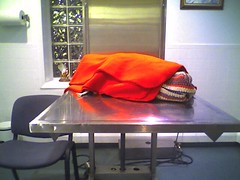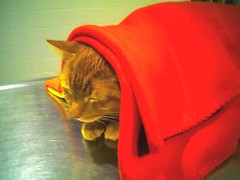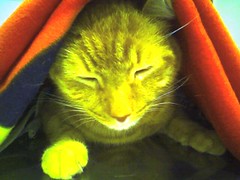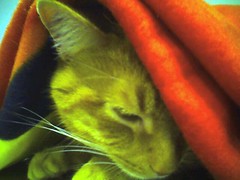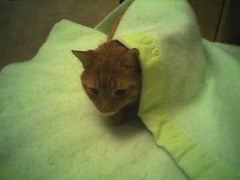 I have realized that the past and the future are real illusions, that they exist only in the present, which is what there is and all there is.
-- Alan Watts
I have realized that the past and the future are real illusions, that they exist only in the present, which is what there is and all there is.
-- Alan Watts
Monday, January 30, 2006
Thursday, January 26, 2006
(Almost) Friday Pet Blogging | Long Day
- There's a metal table -- with a lift, no less.
- Plain walls.
- Roll of paper towls.
- Bundle of blankets on the table.
- Feels maybe a tad confining in this room.
More Pet Blogging
- See the Friday Ark, featuring a compilation of today's pet blogging posts, over at The Modulator.
- Check the M&O Archives for previous Milo & Otis appearances.
- Carnival of the Cats, coming at you every Sunday.
Tuesday, January 24, 2006
Squirrels?!?

Quotable | Attention
 The moment one gives close attention to anything, even a blade of grass, it becomes a mysterious, awesome, indescribably magnificent world in itself.
The moment one gives close attention to anything, even a blade of grass, it becomes a mysterious, awesome, indescribably magnificent world in itself.
Of note: Miller’s first two works, Tropic of Cancer (Paris, 1934) and Tropic of Capricorn (Paris, 1939), were denied publication in the U.S. until the early 1960s because of "alleged obscenity." Apparently, some folks were focusing too much attention to some of Miller's confessional material. So we see that the States' puritanical and "holier than thou" campaigns keep coming around. Ah, the cycles of inanity.
Fruits Fighting Forgetfulness
I wanted to make a comment about this story, but I cannot remember what it was.
British Blackcurrants Beat Alzheimers' Public release date: 23-Jan-2006 "Compounds in blackcurrants could prevent Alzheimer's disease and the characteristics of British berries suggest they do it best…New research led by Dilip Ghosh of the Horticulture and Food Research Institute in New Zealand, shows that compounds in blackcurrants have a potent protective effect in cultured neuronal cells against the types of stress caused by dopamine and amyloid-b, a peptide associated with Alzheimer's disease."
Friday, January 20, 2006
Chinese Government on the Dover (ID) Verdict
"...not everyone agreed with the [Dover ID] ruling. One poll after another has shown that quite a few people really believe that God creates the world and the people in six days described in Genesis. Thus people don't think this ruling has ended the dispute for good. Although creationists will not stop here, they will surely fail in front of science."Go check out the full piece: Is Intelligent Design Science?
Tickle U.
"'It's well-known that you can't tickle yourself … One explanation is that since all the sensations are completely predictable, we do "sensory attenuation" which reduces our touch perception.' Because people continually receive a barrage of sensory information, it's necessary to distinguish between what is caused by our own movements and what is due to changes in the outside world."I'm betting that this "sensory attenuation" occurs in many other areas of life, too. Click to read the full Press Release and see pics of the Virtual Eye-Hand Coordination Laboratory.
Friday Pet Blogging | Update on Milo
More Pet Blogging
- See the Friday Ark, featuring a compilation of today's pet blogging posts, over at The Modulator.
- Check the M&O Archives for previous Milo & Otis appearances.
- Carnival of the Cats, coming at you every Sunday.
Friday Pet Blogging | Separated at Birth?
 (San Francisco Gazette - SFGate.com)
(San Francisco Gazette - SFGate.com)
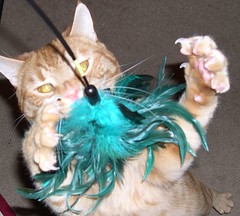 "Give me the freakin' feathers!!"
"Give me the freakin' feathers!!"
More Pet Blogging
- See the Friday Ark, featuring a compilation of today's pet blogging posts, over at The Modulator.
- Check the M&O Archives for previous Milo & Otis appearances.
- Carnival of the Cats, coming at you every Sunday.
Thursday, January 19, 2006
Bishop Spong on "Death with Dignity"
Affirming choice as a human right at the last phase of life requires a shift in thinking about death. Death is not evil or sinful; rather, it is as natural as our birth. Each of life's stages, including the last, must be embraced with vigor.
I challenge those who see the Supreme Court's decision as a harbinger of abuse – who imagine scenarios of state-ordered executions of the elderly or health maintenance organizations curtailing medical payments until a quick death is achieved. The risk of abuse can be eliminated by investing this life-and-death decision solely with the affected individual. Results of Oregon's seven-year experience with the aid-in-dying law show NO evidence of abuse.
The right to a good death is a basic human freedom. The Supreme Court's decision to uphold aid in dying allows us to view and act on death as a dignified moral and godly choice for those suffering with terminal illnesses.
-- Bishop John Shelby Spong
You can read the whole piece here.

